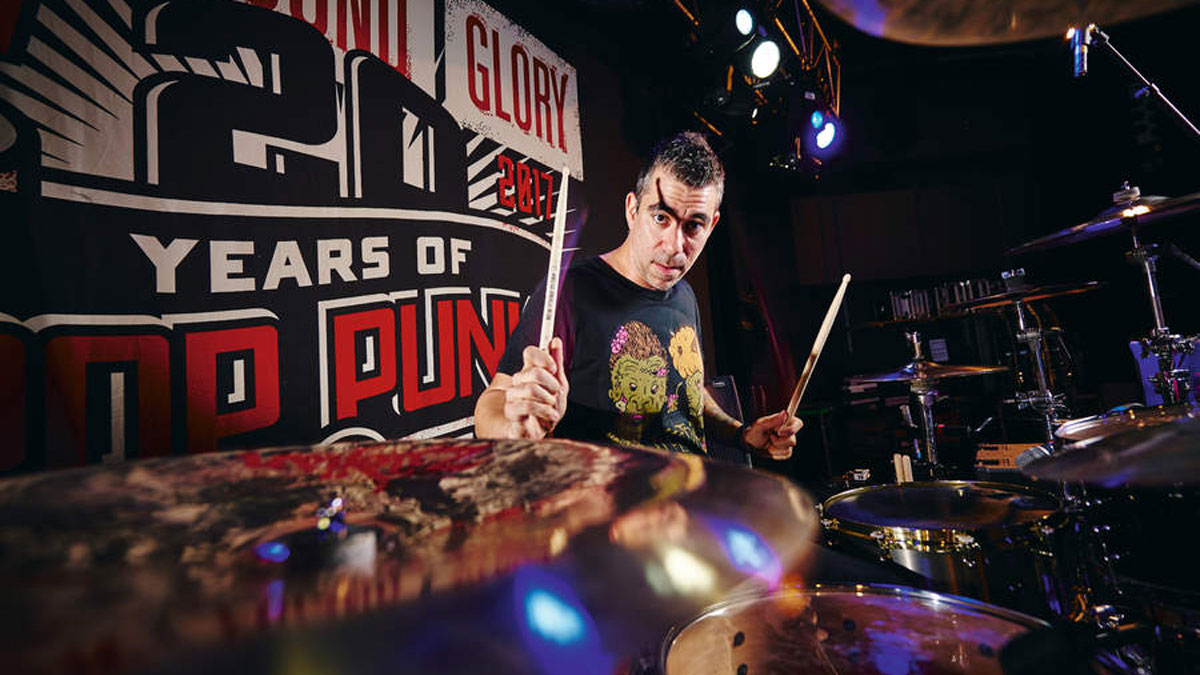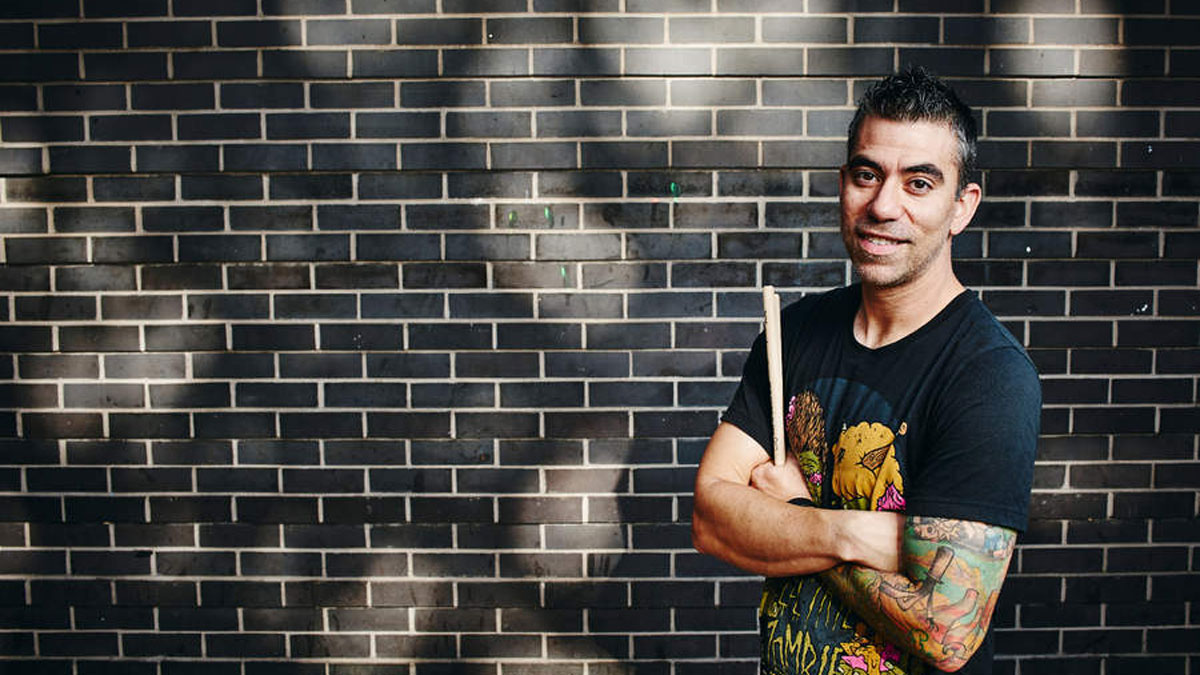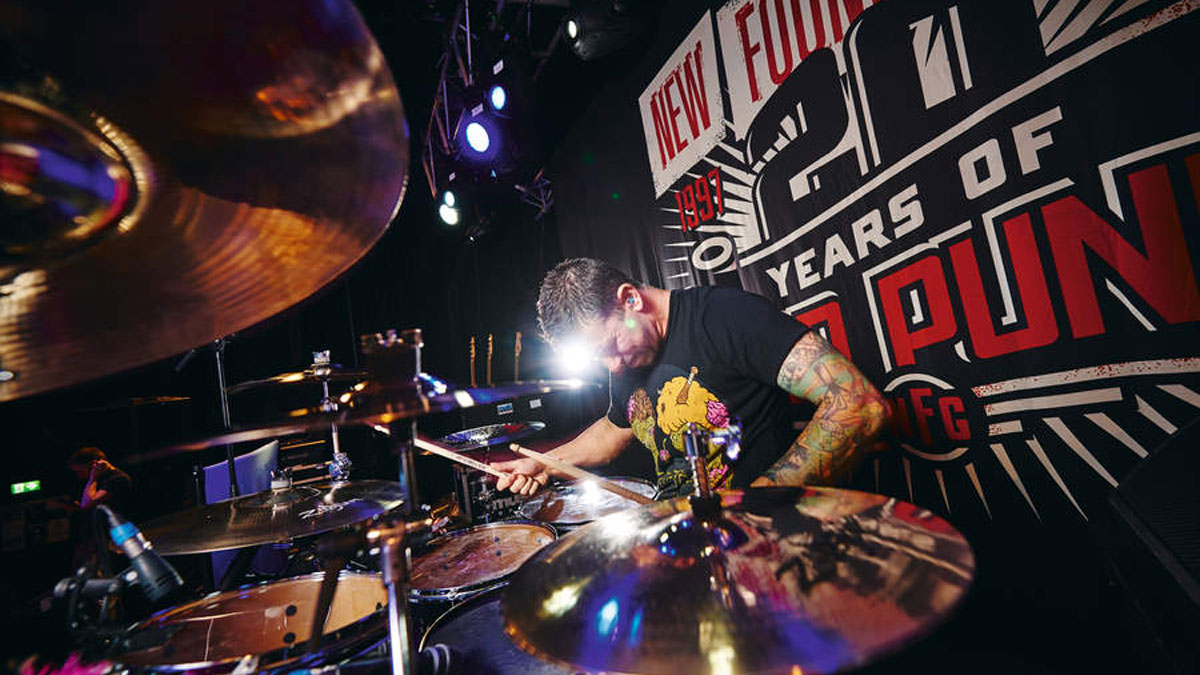Cyrus Bolooki looks back on 20 years of New Found Glory
Two decades of pop punk perfection

20 years on
Twenty years is a long old time for any band to survive, but in the world of pop-punk, in which dewy-eyed teenage love is often the order of the day, it is an almost unthinkable lifespan.
And yet, not only have Cyrus Bolooki and his New Found Glory bandmates hit this milestone, they’re showing absolutely no sign of slowing down. They marked the occasion with a sold-out 20 Years of Pop Punk tour, which included a four-night run of London shows. But how have they done it?
Well, while many bands of the genre find a formula and stick to it, Bolooki and co have adapted down the years, allowing them to pick up an army of new fans alongside their loyal devotees. Whether it be the sugary sweet pop of their first two records, or the harder edged sound of mid-noughties work such as Coming Home, the band has gently evolved its sound.
Even more impressive, they have done so with solid results each time, becoming one of those ridiculously rare bands that manages to make it to album nine (2017’s Makes Me Sick) without dropping a clunker along the way. So, to look back on two decades of success, and peer into what the future holds, we grabbed Cyrus while the band headed through Bristol on that aforementioned celebratory 20 Years… jaunt.
Cyrus, 20 years is an impressive feat… but how did you get your start as a drummer?
“My story was probably a little different to most people’s. I gravitated towards music and piano when I was four or five. My parents had a church organ that they got from a thrift store and I would always mess around on that.
"My parents noticed early on that I would try to mimic music from TV on the organ. Fast-forward to when I was about 12 and my older brother got a guitar for Christmas. He wouldn’t let me play it but whenever he would leave the house I would play it. I taught myself and learned to read music.
“A few years later some friends and I wanted to form a band but we all played guitar, we had no drummer. I said I would try it and I borrowed a drum kit, sat at my house and played. There were a few tension rods missing from that kit and I remember thinking that it really didn’t sound good and wondering if it was me or the kit!
"I taught myself to play the Everything Zen album by Bush. Coming from a guitar background, I was very into alternative rock. I still haven’t taken a lesson. I’m not saying that is the best way, but that was just how it was for me.”
How much of an impact did being a guitarist before a drummer have on your playing style?
“My entire musical background was important. Piano was super-important for me. That is a very important thing for a lot of people. With piano you can really learn music and if you learn piano then you can apply some part of that to any kind of instrument.
"Guitar was huge for me because of the style of music that I was into. Because I was a guitar player in the mid-’90s, Pantera, alternative rock and Metallica was all I listened to. Then when it came to drumming, I was able to really focus on those songs and learn them because I knew them so well as a guitarist.”
How did you come to join New Found Glory?
“In late 1997, New Found Glory got together and I had only really been playing drums for two, maybe two-and-a-half years. I wasn’t a great drummer, by any means. I just got into it and embraced it and played along to anything that I could. New Found Glory fell into my lap. I knew them through friends of friends. They had already played a handful of small shows and recorded a demo tape. A friend gave it to me and I heard this song called My Solution and that hooked me on this band.
"I loved how it went into double time and this fast-time feel. It was everything I thought the band I was in at the time should be doing. After a couple of months, the drummer that New Found Glory had left and I got a call to audition. I auditioned for the band having never played the songs on drums before.
"I had only played them on pillows in my bedroom because my parents didn’t want loud drums in their house. At the end of the first rehearsal together the guys said it was awesome but could I hit a little harder! I’ve never lived that down!”

The big breakthrough
You mentioned a love of alternative rock - did your style easily gel with the rest of the band?
“I came from an alternative background and the other guys in the band came more from punk rock. To me, punk rock was Green Day and Blink-182 and the mainstream bands that you heard on the radio. But because I was into alternative bands, I got a lot from that for my drumming.
"The tempos were a lot slower with those bands and the drummer would often be playing to a guitar riff and I tried to apply that to our songs. One of the things we did early on, at the time punk rock bands were often very fast and playing the same tempo all the time.
"What we brought was having double time and then having a half-time chorus. That would get people jumping. That is one of our biggest accomplishments style-wise. Songs like Hit Or Miss have that half-time bridge.”
As a young drummer, those early gigs and studio experiences must have been a huge learning curve.
“It was extremely nerve-wracking. But recording was also a magical thing to hear how a song and a drum part gets built. To this day, tracking drums for a record is nerve-wracking.
"It is the culmination of a lot of hard work and the microscope is on you. Sometimes you can get crazy about particular nuances that people won’t even hear, like if you’re playing this ghost note right or if you’ve hit the cymbal the right way there.”
How quickly did things take off for the band?
"When we released Nothing Gold Can Stay we could draw a couple of hundred people to a show, which was way bigger than I expected. We then had a couple of milestone moments. We got a call to open up for MxPx, who were a national act. I remember going to an MxPx show and meeting them and I gave them our CDs and T-shirts.
"To my surprise, they mentioned it on stage that night and they had listened to our music and thought it was awesome. Six months later, we got the call to open up for them. That started everything for us. A couple of months after those shows, we had contact from a record label and they came and signed us.
"That label had their own deal with a bigger label, which was MCA and that helped us climb up and push forward.”
I auditioned for the band having never played the songs on drums before. I had only played them on pillows in my bedroom because my parents didn’t want loud drums in their house
Your first album was a hit – so there must have been a fair amount of pressure for its follow-up, Sticks And Stones.
“That record was great. We were 20-year-old kids. It was the first time I had worked with a click track. We were recording to tape. That record showed me that it doesn’t matter how good you think you are, it’s never as good as you think it is. It is never perfect.
"On the first record, I would listen to a take and not hear anything wrong with it but the producer would say he thought I could do it better. On this record, I started writing some fills that I would never have tried on the first record just because I was more comfortable.
"I started experimenting more with different drums as well. On Sticks And Stones I started using different snares on each song. I started using different cymbals. I added a floor tom on my left so I could start trying to play symmetrically.”
Has your kit gone through many evolutions since those early records?
“When I started playing drums one of my favourite bands was Silverchair. They were my sort of age and they were this Cinderella story, a band who won a contest to get a record deal. I zeroed in on their drummer and that was where I got my first set-up from – one-up, two-down.
"I never started with two rack toms and there has only been once or twice where I have used two racks – and when I do I have to have them way over on the left because I can’t have my ride too far away from me. I’m still a one-up, two-down guy. In the studio I might use one floor because a big 18" floor tom might not translate in the studio.
"I did have a floor on my left for a while as well. That was popular back in the day and Travis Barker did it and I thought maybe I should too, but my playing didn’t evolve enough from doing that.
“I did put a double pedal in there as well because we had some songs where there were 16th notes on guitar and it didn’t seem right for me to do anything other than follow that on the kick drum. I don’t really like reaching for that double kick. I have used it creatively and tastefully, but otherwise it is a standard set-up.
"For this 20-year tour, I have put a splash back in there. I have used a splash in the studio but usually on tour I might use a splash in one song, so there’s no point. But on this tour we’re playing so many different songs that I have put one back up there.”

Pop punk elder statesmen
Have you learned a lot about your own playing from revisiting old tracks on this tour?
“I have learned a couple of things. One is that every album is a snapshot in time. With the drumming, each record can have certain themes. There are certain fills that I might have used a few times on a record and that reflects where I was on that day. On Sticks And Stones I’m doing the same fill in Forget My Name as I am in Singled Out. That was just how I was writing at that time.
"It has been fun as well to revisit the songs and add little things in, maybe add in a splash here or there. Some of these records were made 15 years ago, I’m a very different drummer today. I’m much more consistent. I’m not as crazy in some ways, but at the same time I think I hit harder now than I ever have.”
New Found Glory isn’t a band that has stood still, your sound has evolved. How key has that been to your success?
“In the beginning, everything you’re doing is brand new so there is no thought of if you are repeating yourself. But as time has gone on and as we have released more records, you think of that a little bit, but the music dictates all of this. Very few of our songs start, writing-wise, with a drum beat.
"They usually start with guitar and that dictates a little what I will do in terms of tempos. I think about things I can add here or there or maybe I think about what not to do and how I can not do what might be expected of me.
“But then, 20 years into our career, maybe there are some things that I should do that are expected of me. We have built our career and there is a certain New Found Glory sound.
"On our latest record, Makes Me Sick, there are one or two fills that I feel like I ripped myself off. I did that on purpose because they are now my fills. It’s the kind of thing where someone might hear the song and know that it is me playing.”
We have had slow songs, fast songs, heavy, not so heavy, so I have this arsenal of rhythm and fills that I can pick from. It is all about becoming comfortable with yourself
Is it difficult to develop your own sound when your band evolves in the way that NFG has?
“I don’t want to sound conceited by saying that I have a sound now, it’s not as simple as that. But for me to tip a cap to myself, that is fine now. We have had slow songs, fast songs, heavy, not so heavy, so I have this arsenal of rhythm and fills that I can pick from. It is all about becoming comfortable with yourself. I am 23 years into playing drums.
"I don’t always have time to teach myself new things, but it is more about being consistent with who I am and being comfortable. I’m not going to say that on our next record I’ll be playing rudiments on my kick, no, I will play in a way that is consistent and comfortable for me. I’m at the point now where in the studio we might do three takes and that’s it.”
You’re 20 years in, you can’t do this for another 20 years, can you?
“We still enjoy playing shows, a few months ago we released our ninth record. We haven’t even promoted that record yet because we’re doing this 20-year tour, so we will promote that next year and then I am sure we will do another record after that. There really is no end in sight for us.
"We’ve always told ourselves that we will keep on doing this for as long as it is fun. I can’t think of anything else that I would rather be doing. Getting up on stage and slamming the hell out of my drums is something that I can’t even begin to describe to anybody how that makes me feel.
"I can sit there and see people moving along to my beats. You can’t get that feeling anywhere else and that feeling will keep me here for a long time to come.”
Rich is a teacher, one time Rhythm staff writer and experienced freelance journalist who has interviewed countless revered musicians, engineers, producers and stars for the our world-leading music making portfolio, including such titles as Rhythm, Total Guitar, Guitarist, Guitar World, and MusicRadar. His victims include such luminaries as Ice T, Mark Guilani and Jamie Oliver (the drumming one).
